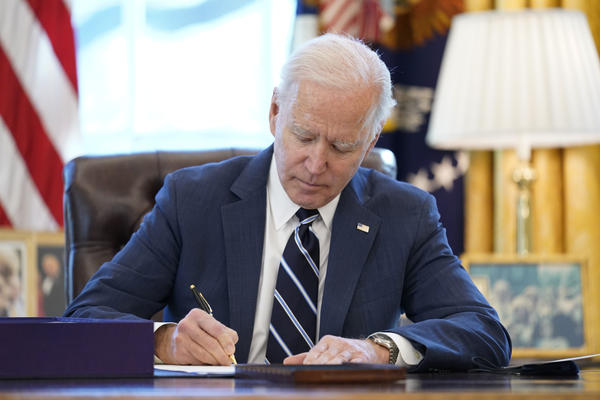
- Details
- By Native News Online Staff
WASHINGTON — One year to the date that the World Health Organization declared a global pandemic for the deadly coronavirus, President Joe Biden signed into law the $1.9 trillion American Rescue Plan that was passed by the U.S. Senate on Saturday and by the U.S. House of Representatives yesterday.
Within the American Rescue Plan is $31.2 billion that has been allocated to Indian Country, the largest amount of money ever allocated for American Indian/Alaska Native programs in history.
The plan also includes $1,400 direct payments for 85 percent of Americans, vaccine distribution efforts, school re-openings, extended unemployment benefits through September, among many other things. To be eligible for the full $1,400, individuals must have an adjusted gross income (AGI) below $75,000. Married couples filing jointly must have an AGI under $150,000 to receive the full $2,800.
“People can expect to start seeing direct deposits hit their bank accounts as early as this weekend. This is, of course, just the first wave,” White House Press Secretary Jen Psaki said on Thursday afternoon. “Payments to eligible Americans will continue throughout the course of the next several weeks.”
The $31.2 billion set aside for tribes in the American Rescue Plan are a welcome in Indian Country.
“This money comes not a moment too soon for the tribes and nations,” Bill Snell, executive director of the Rocky Mountain Tribal Leaders Council said. “We are grateful to President Biden and the leaders and rank and file members in Congress who recognized the catastrophic impact COVID-19 had on Native Americans.”
The disbursement for Native Americans also includes $6 billion for Indian Health Service and $1.28 billion for tribal and Native Hawaiian housing programs to help offset some of the economic plight Indigenous Americans have suffered because of the fallout of the coronavirus.
“It has been long, hard fight to get Washington to see that Indian Health Services was woefully underfunded to handle a crisis of this magnitude, especially when you are talking about people who are traditionally at-risk to disease and sickness that invade North America,” said Tom Rodgers, president of the Global Indigenous Council. “It took a pandemic to give this country a history lesson.”
Gay Kingman, executive director of the Great Plains Tribal Chairman’s Association, also hailed the White House and Congress for the much-needed coronavirus aid.
“This federal investment gets us closer to leveling the playing field for Native American healthcare, but we are confident that we now have partners in Washington that are enlightened to the neglect the health care system serving Indigenous Americans has had to endure,” Kingman said.
More Stories Like This
Native News Weekly (May 19, 2024): D.C. BriefsNative Artist and Former Cultural Advisor to the Chicago Blackhawks Sues Team for Sexual Harassment, Fraud
First Lady Jill Biden 'Shows Up' in Indian Country
National Indian Gaming Commission Announces Sharon Avery as Acting Chair
The Jicarilla Apache Nation Mourns the Passing of President Edward Velarde
These stories must be heard.
This May, we are highlighting our coverage of Indian boarding schools and their generational impact on Native families and Native communities. Giving survivors of boarding schools and their descendants the opportunity to share their stories is an important step toward healing — not just because they are speaking, but because they are being heard. Their stories must be heard. Help our efforts to make sure Native stories and Native voices are heard in 2024. Please consider a recurring donation to help fund our ongoing coverage of Indian boarding schools. Donate to Native News Online today and support independent Indigenous-centered journalism. Thank you.

